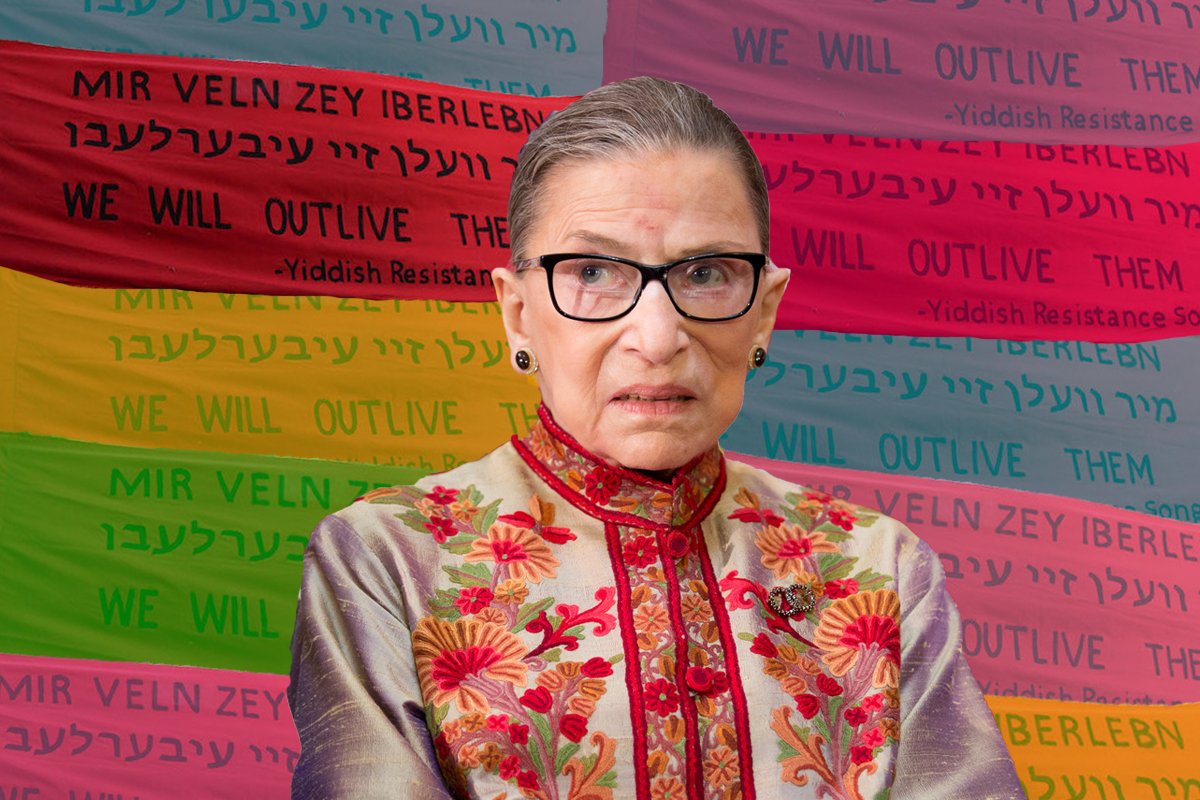On Wednesday, Supreme Court Justice Ruth Bader Ginsburg gave us a powerful reminder that she’s not going anywhere. In an interview with NPR, the Jewish Justice recalled a striking moment she had with the late Republican Senator Jim Bunning. She said:
“There was a senator — I think it was after the pancreatic cancer — who announced with great glee that I was going to be dead within six months. That senator — whose name I’ve forgotten — is now himself dead. And I am very much alive.”
Though these remarks were simply meant to be a subtle way of showing the country that she is, in fact, in good health despite multiple bouts of cancer and a few broken ribs, they tapped into something larger. The words “I am very much alive” evoke a deeply Jewish sentiment of resistance: “We will outlive them.”
As history tells us, the Hasidic Jews of Lublin, Poland were backed against a barbed-wire fence and commanded to sing as they were being executed in 1939. One man began, “Lomir zich iberbetn, iberbetn, iberbetn,” meaning, “Let us reconcile…” but no one joined in.
So, he improvised: “Mir veln zey iberlebn, iberlebn, iberlebn.” “We will outlive them.” The men began to join him until all of the Jews were singing and dancing feverishly. At first, the SS commander laughed along.
But then, as historian Moshe Prager writes, “he realized they weren’t accommodating him; they were defeating him. He ordered them to stop.”
They didn’t, not until the very last moments of their lives.
This story evokes the deepest sense of what it means to be a Jew: to survive and to thrive. For 2000 years, the Jewish people have lived in the diaspora, unwanted and unwelcome among those who sought us harm. We have survived exile, Inquisitions, isolation, pogroms, and the Holocaust. Yet we danced.
Then, we built ourselves new homes and new communities, fought (and continue to fight) for our basic freedoms and the ability to live our lives as fully Jewish people. Even amidst rising rates of anti-Semitism across the globe, the Jewish people thrive.
Mir veln zey iberlebn. We will outlive them.
Jewish activists have rediscovered this part of our story and have used this resistance song to take a stand against injustice and oppression. The phrase is one that I myself have used on posters I’ve brought to protests. It evokes our shared history and cultural community that unites us as a people, such as after the Tree of Life Synagogue shooting that took the lives of 11 souls. And it has become a rallying cry against injustice faced by others. Jews have turned up in historic numbers to protest the crisis at the border. We understand that when one group hurts, we all hurt. We know because we have lived through it.
We will outlive them.
I am very much alive.
I don’t know if Justice Ginsburg intentionally meant to invoke this history when she chose those words. But she herself has been an exemplar of resistance. She has been vocal about her support for abortion rights, fair pay for women, and gender discrimination, and has time and time again used her position on the Supreme Court to fight for these rights. She has also been open about the Jewish values that guide her, as described by her biographer Jane Sherron De Hart:
“I think that [tikkun olam] was very much emphasized by her mother,” she explains, “and I think it made particular sense for a child growing up in the depression, in World War II, learning about the Holocaust, and the huge need for repair after the atrocities of the war and the Holocaust. I think [Celia] emphasized the sense of social justice that is very often a part of Judaism.”
And at just 13 years old, Ginsburg wrote for her synagogue bulletin: “Many people have been left with scars that take a long time to pass away. We must never forget the horrors which our brethren were subjected to in Bergen-Belsen and other Nazi concentration camps. Then, too, we must try hard to understand that for righteous people hate and prejudice are neither good occupations nor fit companions.”
At a speech given at the U.S. Holocaust Memorial Museum in 2004, she said: “My heritage as a Jew and my occupation as a judge fit together symmetrically. The demand for justice runs through the entirety of Jewish history and Jewish tradition. I take pride in and draw strength from my heritage, as signs in my chambers attest…the command from Deuteronomy: ‘tzedek, tzedek, tirdof’ — ‘Justice, justice shall you pursue.’ Those words are ever-present reminders of what judges must do that they ‘may thrive.’”
Justice Ginsburg has certainly let us thrive. Thanks to her, we are very much alive.
Image of RBG via Allison Shelley/Stringer



